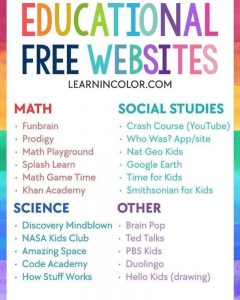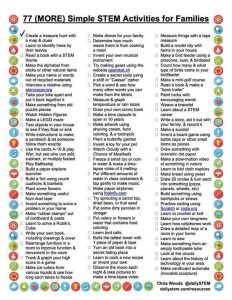Home Learning (COVID-19)
Here are a few more ideas of things you can do to help your child to learn. Our suggestion is that you give your days some routine and maybe dedicate an hour or two to schoolwork.
The work outlined below is known as Project Homework. You can pick as many of the activities below over the next week. Every subject is covered below and some require the help of family, some can be done on a computer, but most can be done on your own. Each activity has an explanation so click on it to read more.
Some of the activities below have a link to click on for more information. Others link to a website with further instruction.
Body and Mind
HIIT Homework
Stick on your favourite upbeat playlist and try out these exercises one after the other. To give yourself a bigger challenge, do each circuit twice or three times or more!
Session 1 – 5 x 25 |
Session 2 – legs moving |
Session 3 – up and down |
|
|
|
OR
Have a family disco – stick on your favourite tunes and bop around the room for 20 minutes!
Get Outside
Try out as many of these exercises outside (keeping social distance!) that you can.
| ● Cycle your bike for 10 minutes
● Go for a walk ● Ride your scooter for 10 minutes ● Draw your own hopscotch with chalk and play ● Throw a ball against a wall and catch ● Create your own obstacle course ● Run for 5 minutes ● 10 minutes of free play outside
|
● Jump on your trampoline
● Bubble bashing – get someone to blow bubbles for you to try and burst all of them ● Do 3 laps of your house or up and down the hall 10 times ● Keepie uppies – how many can you do in a row? ● Skip sideways up and down the garden 5 times |
Skype with a Relative
This can be a nice idea if you have a family member who may have to self-isolate or who you may not be able to visit. It’s a way for children to use oral language and it might be a nice kind of game to play to keep boredom away.
Ideas include:
- Play 20 questions – take turns in thinking of an object and the other person can only ask questions which have a yes or no answer.
- A-Z – Pick a topic and take turns in naming something beginning with A then B then C and see if you can get to Z Without skipping any letters.
- The Big Interview – child prepares 10 questions they’d like to know about the relative and then asks them
- More ideas here: https://www.fluentu.com/blog/educator-english/esl-vocabulary-games/
Irish Times
Even if you can’t speak Irish, there are some great ways to pick up some vocabulary. One really easy activity is to pick a topic, for example: food, household objects, colours, and so on, then write down 20 words associated with that topic in a list. Next go to https://www.focloir.ie/en/ and translate the words. The great thing is that almost every word on the website has an audio recording of it so you can listen to how to pronounce the words! As a family, you could try and learn a few words every day!
For more advanced speakers, how about doing any of the tasks in the grid through Irish? The news is probably the easiest one to do as Gaeilge.
Another idea is to sign up to https://www.duolingo.com/course/ga/en/Learn-Irish to learn some Irish – 5 to 10 minutes a day and who knows how fluent you’ll be when you get back!
The Daily News
This task can be done with any age from Junior Infants to 6th class. It can be done in a number of ways but here is a suggestion for 2 different age groups:
| Infants to 1st Class | 2nd Class Upwards |
| ● Child tells you the news they have for the day. Stick to things in their own life rather than focusing on the news on the radio or TV.
○ The day, the date, the weather outside ○ 1 or 2 things they did yesterday ● Write down what they tell you on a whiteboard or piece of paper. ● Child either types out what you’ve written or copies it down in a journal or copybook. ● You can create your own little newsroom on the kitchen table or you can use Green Screen apps on an iPad and record your child reading their news. ● You can send the video to loved ones to keep in touch. |
● Child writes/types their news as well as news happening outside the world.
● You can create your own little newsroom on the kitchen table or you can use Green Screen apps on an iPad and record your child reading their news. ● You can send the video to loved ones to keep in touch. |
Read a Book with a Parent
Snuggle up on the couch and spend ten minutes reading for no other reason than the joy of reading a book. Of course, there are loads of benefits to reading every day but what a nice time to drop everything for a short time.
Family Tree
Make your family tree with your child. You can do this digitally or by hand and you can go back as far as you want!
BIGGER PROJECTS
These instructions are for these projects:
- The History of my Family An extension of the Family Tree Project – tell us about your family
- Peace What does peace mean to you? How will we get there?
- Who is your favourite artist? Tell us something about your favourite artist – A singer? A painter? A poet?
- My Holiday Tell us about your last holiday
Here are some ways you can produce it
- Write it! Make your project on paper and bring it to school when it reopens.
- Type it! Make your project adding text, images and maybe video
- Build it! Using whatever materials you want, build and make your project
- Present it! Make a Google Slideshow/Ppwerpoint/Prezi presentation about your project
- Make a Book! Use Book Creator on an iPad or Chromebook to make a book about your project
- Video it! Grab a phone and hit record
- Your way! Present your project in whatever way you want – whether it’s a virtual tour or even a podcast, do what you like!
You can do this project in Irish or English.
A Sketch A Day
If you have a copybook or sketchpad, this would be useful but you don’t really need anything except paper and a pencil. Your job is to create one sketch a day for the duration of the project. The only catch is you have to pick a theme. Choose from:
- Healthy Foods
- Happy Things
- Things that need batteries
- Famous People
- Objects that are usually red
Learn a musical instrument
Do you have a musical instrument at home? If not, it’s not too expensive to get yourself a tin whistle, recorder or even a ukulele. It’s never been easier to learn with loads of apps and websites to bring you along the way.
Tin Whistle: https://www.youtube.com/watch?v=kdUH1QZvEm8
Piano / Keyboard: https://www.youtube.com/playlist?list=PLJOfTzSYW-9q2WSmGH1CNjmP3–2qaXN5
Ukulele: https://www.youtube.com/watch?v=5bTE5fbxDsc
Puppet Show
Making a puppet show can be a fun way to spend some time and there’s lots of different ways to do it now.
- Make a sock puppet – https://www.youtube.com/watch?v=e-mfUBQE3_s
- Make finger puppets – https://www.youtube.com/watch?v=6eq370x_lvo
- Make an online Puppet Show – Puppet Pals App
The main thing is to write the scripts and record them! If you have a puppet show stage, great; if not, use a table to hide underneath!
Cool Patterns
Patterns are everywhere – some of them simple like the sequence of a traffic light and some of them are really difficult like the swirls on a snail’s shell. Your job is to make a pattern using any medium you want. You could knit a scarf in 2 different colours or you could build a tower using Lego with different patterned levels. You could even write a long sequence of numbers that follow a pattern. Be inventive and try and think of something
Practical Tips and Tricks on Home-Based Learning
Please see below some practical tips and tricks on home-based learning, during the current school closure:
Free writing
Many pupils will be familiar with the concept of “free writing” and may have a special notebook or journal in which they write freely about any topic of choice, and in any genre. This is a simple idea that can be continued in the home setting. Children have the autonomy to decide what they wish to write about and there are a variety of different styles that they can practice:
- Diary writing (personal accounts)
- Recount writing (a report of an event)
- Fiction (short stories)
- Instructional writing (e.g. rules of a game *the children can even come up with a new idea and create their own game!)
- Poetry (Limericks, acrostic poems etc.)
https://storybird.com/member-family-plan (offer a free 7-day trial)
Letter writing
Post from a pen-pal and the anticipation of awaiting the arrival of a response may be lost in our global world where social media has taken over the art of writing, but this may be the time to resurrect that magic!
Another interesting idea is to chart the journey of a letter from the writer to the recipient. An Post have an educational resource on their website https://www.anpost.ie/anpost/schoolbag/primary/our+people/the+journey+of+your+mail/
Children can also design their own stamp or begin a collection of stamps and look out for special commemorative stamps that were commissioned by An Post to celebrate a particular occasion.
Lists
If parents are venturing out to shop and stock up on groceries, children can help by writing the list of what is needed. Depending on the age of the child, elements of mathematics could be incorporated here estimating prices and weights etc. Children could also work out which option is better value (e.g. two individual boxes containing 80 teabags or one box with 160 etc.)
Book review
We all know that a grá for reading is one of the most important gifts that we can pass on to our children. Use this opportunity to read a wide selection of books. Children can then write a review, give their personal opinion, talk about their favourite character and give a star rating. They may have a chance to present this in front of an audience in their own home (i.e. immediate family – maintain social distance!)
https://pdst.ie/sites/default/files/Time_to_Read_Int_04_0.pdf
Caint agus cómhrá
Bí ag caint as Gaeilge chomh minic as is féidir!
Try to incorporate Irish into daily activities. As well as cartoons on TG4, children can play games such as “I spy” (Feicim le mo shúilín) as Gaeilge and perhaps put labels (lipéid) on items around the house. There are some useful websites online to support the learning of Irish (mar shampla Duo Lingo agus Seomra Ranga).
Cooking and baking (weight and time)
- How many / how much of an ingredient is needed?
- If a recipe is to serve 2 but the meal is for four people, we must double the amount.
- If the dish takes 45 minutes to cook, what time will it be ready at?
- Make an analogue clock.
- Convert time on an analogue clock to digital time.
Shape Hunt
A “shape hunt” in the home / garden (shape and space strand in primary maths curriculum). Children identify and classify as many items as possible.
Time (schedules)
Children can look at a tv guide from a newspaper and work out duration of programmes.
Distance
Children can incorporate distance into football / hurling drills. How far do they think (estimate) they can throw a ball? Use a measuring tape to obtain an accurate answer.
Project work
Children can work on a longer-term project based on a theme of their choice.
A scrap book is ideal, and children can cut and paste articles, pictures, diagrams and pieces of writing.
Other children may prefer to use their IT skills and create a PowerPoint presentation.
Interviewing
Children can devise a list of questions for a member of their family / wider family circle. For example, with grandparents / aunties / uncles they could explore aspects of the past (school life / pastimes / festivals and traditions around Easter etc.). This can link nicely with the “Then and Now” strand of the History curriculum.
If possible, where children can communicate with grandparents via phone / facetime / skype this is a good way of keeping contact during this period where circumstances dictate that they must not visit older relatives.
Creative arts
Most homes will have a “bits-and-bobs” box or a bosca somewhere with nets, buttons, lids, wrapping paper etc. Now is a good time to use those recyclables and create a piece of artwork. Children should be encouraged to be original, be creative – and don’t forget to take a picture!
Outdoors / physical activity
There are endless opportunities for physical activity. Even if children are playing on their own or in very small groups, there are many fun ways of keeping active:
- Hopscotch
- Skipping
- Hula-hoops
- Obstacle courses
- Treasure hunts
Local GAA clubs and county teams have been posting videos on their social media outlets with some of their star players demonstrating drills that children can follow.
Nature walks
This is one for parents and children. It is so important to remember to get active and get outdoors to open spaces.
Incorporate science, geography, oral language, drama and music into a walk whether it’s in a nearby park, along a beach or in the countryside.
Back to basics – other enjoyable, but educational activities
- Board games
- Card games
- Lego
- Jenga
- Jigsaws
- Flying a kite
- Memory games (e.g. stop the clock with one letter of the alphabet and come up with words beginning with a specific letter under certain headings such as boy name; girl name; country / city; food; item of clothing; activity; kitchen utensil etc.)
- Recreate “Countdown” television programme with word puzzles and maths problems.
- Painting
Online resource bank for primary school level
Scoilnet.ie
A very useful online forum with a wide array of resources (emphasis on free tools). Resources are organised into theme pages and the website is easy to navigate.
Twinkl.ie
Created by teachers, ideal for home education, it has lots of appealing games, stories, worksheets etc. It is offering a free month’s subscription (enter offer code: IRLTWINKLHELPS).
Cúla4.com
A collection of resources as Gaeilge – cláir, físeáin, cluichí, tomhais agus srl.
Ask about Ireland
A treasure trove of resources with an Irish interest, focusing on our national culture.
Padlet.ie
A collection of tools, apps, ideas and sites to support Irish Primary pupils working at home, compiled by Ciara Reilly primary-school teacher and lecturer in education with Marino Institute.
MúinteoirLOI
Another resource created by primary school teacher Tom O’Connor which is ideal for anyone who has a house full of League of Ireland fans this morning. Free themed lessons focused on Irish soccer clubs.
Go Noodle
Movement and mindfulness videos created by child development experts.
Scratch
Learn to programme interactive games, stories and animations.
Khan Academy
Non-profit site with provides free video tutorials in maths and reading.
IXL.com
Subscription-based learning experience that provides curriculum-aligned maths and English content from junior infants up to sixth year.
National Geographic Kids
Learn about science, geography and history.
Nasa Kids’ Club
Child-friendly resource where kids can learn about science and space.
I am an Artist
A visual arts initiative comprising 30 short TV programmes (each 6 minutes in length), an interactive website with slideshows, lessons, weblinks and interactive games, providing a stimulating collection of curriculum-mapped resources.
- Scoilnet:
Scoilnet Website – students can access over 20,000 resources shared by primary and post-primary teachers anytime, anywhere. Search materials by class/year group, subject, strand, and learning outcomes.
World Book Online –all students in Ireland have open and free home access to World Book Online. World Book is a trusted encyclopedia containing thousands of informational articles with stunning illustrations, videos, interactive maps, research
help, and activities.
Scoilnet Dedicated Subject Pages – the Scoilnet team is working hard to bring teachers and students dedicated post-primary subject pages where they will find teacher-shared collections, collections by organisations, and what’s in demand or popular on Scoilnet right now for their subject area.
Choose from: Maths, Science, Irish, English, History, Modern Foreign Languages, Geography, Politics and Society.
Scoilnet Theme pages –primary school students can access subject based themed pages. Each theme page presents a set of links and resources on a particular topic.
- Twinkl are offering a one month free subscription to everyone. This site is packed full of fun activities, ideas and resources and well worth checking out!
- Twinkle Ireland have School Closure Packs
Twinkl have been busy creating a variety of resource packs for children from Junior Infants to 6th Class. Each pack contains fun, challenging, engaging and interactive work so children can continue their learning at home. These packs will keep your children busy during school closures.
- Science: the link below will allow children to explore different areas of interest with clearly explained activities.
- Mind your Mental Health
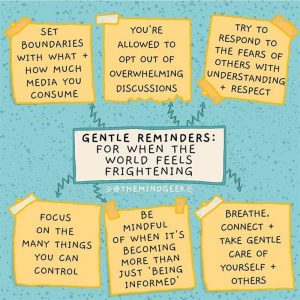
- More Activities to be found below
Ciara Reilly (@primedteacher) is a lecturer in ICT and Digital Education at Marino Institute of Education and has put together lots of resources suitable for distance learning on this Padlet
https://padlet.com/ciarareillymarino/primarydistancelearning
- Activity challenge
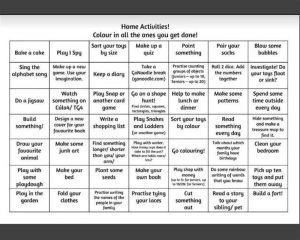
- Tips for reading at home with your child
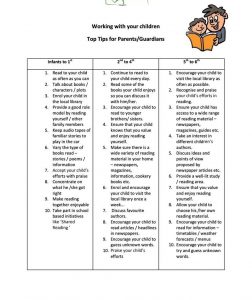
Useful Websites:
Khan Academy
https://www.khanacademy.org/
Especially good for maths and computing for all ages but other subjects at Secondary level. Note this uses the U.S. grade system but it’s mostly common material.
BBC Learning
http://www.bbc.co.uk/learning/coursesearch/
This site is old and no longer updated and yet there’s so much still available, from language learning to BBC Bitesize for revision. No TV licence required except for content on BBC iPlayer.
Futurelearn
https://www.futurelearn.com/
Free to access 100s of courses, only pay to upgrade if you need a certificate in your name (own account from age 14+ but younger learners can use a parent account).
Blockly
https://blockly.games/
Learn computer programming skills – fun and free.
Scratch
https://scratch.mit.edu/explore/projects/games/
Creative computer programming
Ted Ed
https://ed.ted.com/
All sorts of engaging educational videos
National Geographic Kids
https://www.natgeokids.com/uk/
Activities and quizzes for younger kids.
Duolingo
https://www.duolingo.com/
Learn languages for free. Web or app.
Mystery Science
https://mysteryscience.com/
Free science lessons
The Kids Should See This
https://thekidshouldseethis.com/
Wide range of cool educational videos
Crash Course
https://thecrashcourse.com/
You Tube videos on many subjects
Crash Course Kids
https://m.youtube.com/user/crashcoursekids
As above for a younger audience
Crest Awards
https://www.crestawards.org/
Science awards you can complete from home.
iDEA Awards
https://idea.org.uk/
Digital enterprise award scheme you can complete online.
Paw Print Badges
https://www.pawprintbadges.co.uk/
Free challenge packs and other downloads. Many activities can be completed indoors. Badges cost but are optional.
Tinkercad
https://www.tinkercad.com/
All kinds of making.
Prodigy Maths
https://www.prodigygame.com/
Is in U.S. grades, but good for Primary age.
Cbeebies Radio
https://www.bbc.co.uk/cbeebies/radio
Listening activities for the younger ones.
Nature Detectives
https://naturedetectives.woodlandtrust.org.uk/naturedetect…/
A lot of these can be done in a garden, or if you can get to a remote forest location!
British Council
https://www.britishcouncil.org/school-resources/find
Resources for English language learning
Oxford Owl for Home
https://www.oxfordowl.co.uk/for-home/
Lots of free resources for Primary age
Big History Project
https://www.bighistoryproject.com/home
Aimed at Secondary age. Multi disciplinary activities.
Geography Games
https://world-geography-games.com/world.html
Geography gaming!
Blue Peter Badges
https://www.bbc.co.uk/cbbc/joinin/about-blue-peter-badges
If you have a stamp and a nearby post box.
The Artful Parent
https://www.facebook.com/artfulparent/
Good, free art activities linked to from this Facebook page
Red Ted Art
https://www.redtedart.com/
Easy arts and crafts for little ones
The Imagination Tree
https://theimaginationtree.com/
Creative art and craft activities for the very youngest.
Toy Theater
https://toytheater.com/
Educational online games
DK Find Out
https://www.dkfindout.com/uk/…
Activities and quizzes
Twinkl
https://www.twinkl.co.uk/
This is more for printouts, and usually at a fee, but they are offering a month of free access to parents in the event of school closures.
Maths:
www.topmark.co.uk (all age appropriate)
www.ie.ixl.com (all games sorted into year groups)
Literacy:
www.topmarks.co.uk (literacy games)
www.katemessner.com/read-wonder-and-learn-favorite-authors-illustrator (stories and activities)
www.nessy.com/free-trial/signup (8 weeks of free resources aged 5-13)
www.bbc.co.uk/schools/websites/4_11/site/literacy.shtml
www.education.com/games/early-literacy-concepts/
www.primaryhomeworkhelp.co.uk/literacy/
www.primarygames.com/reading.php
www.teachyourmonstertoread.com/
Gaeilge:
www.duolingo.com/course/ga/en/Learn-Irish
Other useful sites:
www.twinkl.ie/offer and enter code IRLTWINKLHELPS
Cosmic Kids Yoga- story through yoga on you-tube.
www.learnenglishkids.britishcouncil.org/
- NON-SCREEN ACTIVITIES FOR HOME
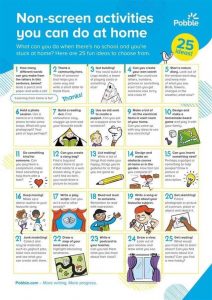
- We are all keeping an eye on our physical health, but it’s also important to keep our mental well-being in mind, as stress levels, worry and anxiety may be heightened due to the uncertainty at this difficult time.This is worded for those in the workplace, but the concepts can be applied to any setting.
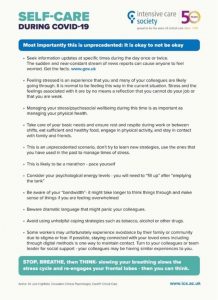
- Art:
With most of the country pretty much on lockdown, artist Will Sliney has come to the rescue! Sliney is from Cork and has worked on Marvel’s Star Wars, Spider-Man, and artwork for Everton Football Club.
Last week he came up with an idea to set a daily art challenge for everyone who is stuck at home. Sliney encouraged people to give it a go for themselves or print out his drawing and colour it in. And since then thousands of children are taking part!
You and your families can get involved by visiting Will’s Twitter account or follow the hashtag #WeWillDraw.He also shares lots of videos to his YouTube.Happy drawing!
- Books coming to life:
Olivers Jeffers on FACEBOOK:
For all you folks stuck at home in the coming weeks. Starting on Monday, at 6pm GMT / 2pm EST / 11am PST
I will be reading one of my books every weekday, and talking about some of the things that went into making it.
We are all at home, but none of us are alone.
Let’s be bored together.
Also, my pal, and one of the best storybook writers in a generation @macbarnett will be doing the same with his books daily, an hour later.
And the genius minds behind @kaleidoscopeire are doing a daily creative project called ‘Home Club’, also starting Monday.
ADDITION:
I will make it available to watch later for those in other time zones.
- Writing:
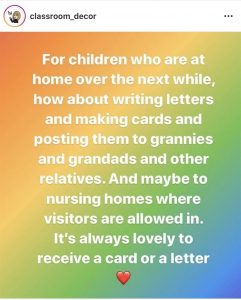
- Read, Read, Read!
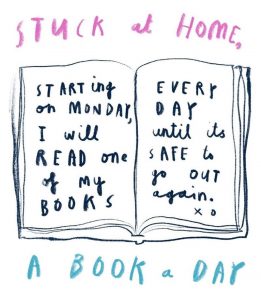
- While implementing social distancing some may still have good access to outside spaces so here’s another few ideas to allow the children burn off some energy.
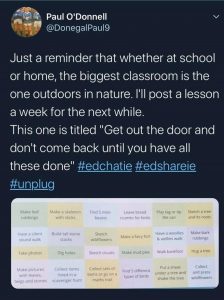
- A step-by-step step guide to joining the Library online. What a fantastic facility for Adults & Children alike. Thank you @LibrariesIre @corkcolibrary
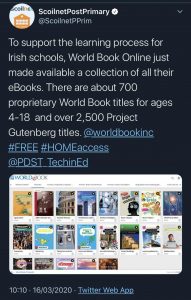
- Some Activity Lists that may give you some new ideas
